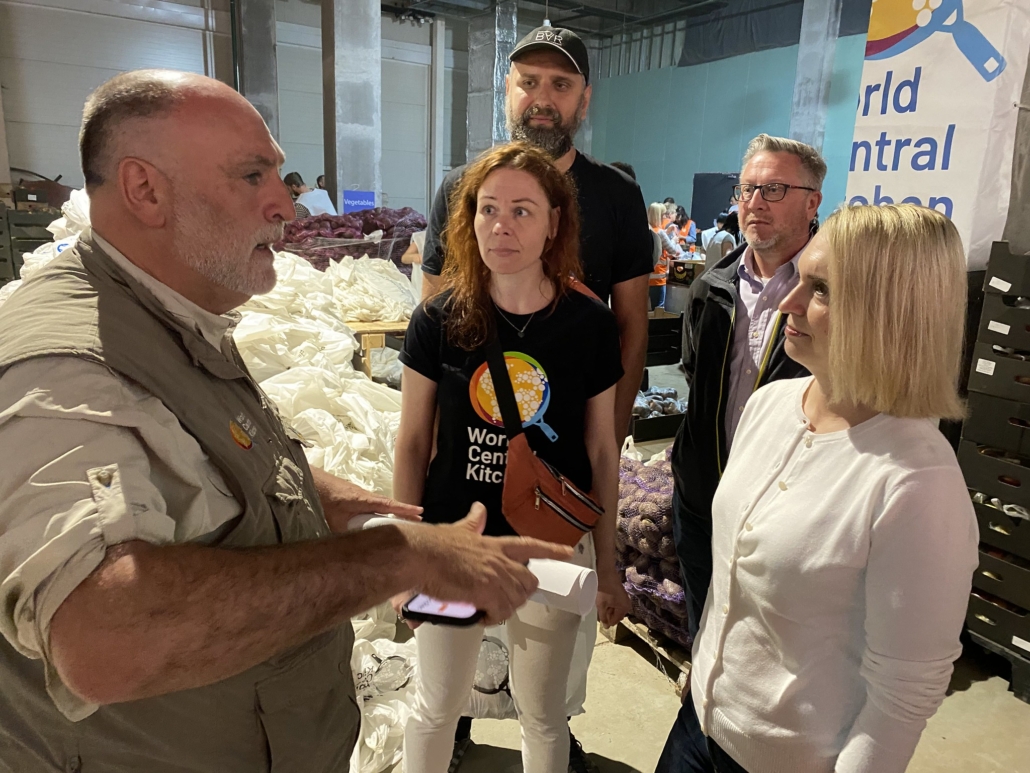World Central Kitchen’s Work in Ukraine
 The war in Ukraine has posed a significant threat to the region’s food supplies as ports and bridges have been under attack, limiting exports of Ukrainian grains to the rest of Europe. On June 6, 2023, the Kakhovka hydroelectric dam exploded, flooding one of the world’s largest reservoirs and displacing 190,000 people from the Mykolaiv region in Ukraine. Flooding destroyed entire villages and ravaged miles of crops.
The war in Ukraine has posed a significant threat to the region’s food supplies as ports and bridges have been under attack, limiting exports of Ukrainian grains to the rest of Europe. On June 6, 2023, the Kakhovka hydroelectric dam exploded, flooding one of the world’s largest reservoirs and displacing 190,000 people from the Mykolaiv region in Ukraine. Flooding destroyed entire villages and ravaged miles of crops.
This reservoir is known as “Europe’s breadbasket,” and according to The New York Times, it irrigates millions of acres of farmland. Its catastrophic flooding puts food for millions at risk. More than 5 million Ukrainians are already internally displaced, with an additional 8 million seeking refuge outside of Ukraine. Today, one-third of families in Ukraine are food insecure. Here is some information about World Central Kitchen’s work in Ukraine to feed Ukrainian families.
About World Central Kitchen’s Work in Ukraine
Since 2011, World Central Kitchen (WCK) has worked on the front lines of humanitarian crises, feeding those cut off from a stable food source. Since the onset of the war in Ukraine, WCK has cooked and delivered 235 million meals to refugees in seven other countries and people still in Ukraine.
On the same day the dam exploded, World Central Kitchen in Ukraine set up sites for evacuees. Volunteer teams from the Mykolaiv and Kherson regions arrived at Pryozerne, a village that was underwater. WCK teams used inflatable boats to transport the supplies to reach families stuck without food or drinking water.
How the World Central Kitchen Works
The goal of WCK is to provide hot, locally sourced meals for those with nothing to eat. First Food Fighters respond immediately to disasters where the need is greatest and then partner with local restaurants to affect long-term change. Its approach has come to include meal kits and bags of groceries.
In an interview on “The Late Night Show,” founder of World Central Kitchen Jose Andres, recipient of the 2018 Humanitarian of the Year by the James Beard Culinary Foundation, said of his decision to act: “I think I got tired of sitting in the comfort of my home and seeing that actually big problems had really simple solutions.”
In 2010, Andres went to Haiti to cook for victims of a devastating earthquake. He noticed inefficiencies in existing crisis response systems. Emergency provisions did not arrive soon enough nor stay long enough. To remain community-driven and sustainable, World Central Kitchen partners with local restaurants and chefs. José Andres formed a cooking school École des Chefs alongside a Haitian chef to permanently improve access to quality food in Haiti. Since then, WCK has spearheaded infrastructure that increases food stability in hard-hit regions.
Chefs for Ukraine
Chefs for Ukraine is a branch of WCK. It runs the largest food relief network in Ukraine, with sites in Kyiv, Kramatorsk, Kharkiv and Lviv, among others, despite active missile strikes. In a #ChefsforUkraine interview, a Food Fighter explains, “There is an urgent need for World Central Kitchen. Food is a big contribution because people in the 21st Century are dying of hunger.”
In Kramatorsk, at the end of a train line, World Central Kitchen in Ukraine opened an aid site within hours of Russia’s first attack. As more residential areas are targeted, Chefs for Ukraine sites feed refugees – mostly women, children and seniors. Currently, thousands of Food Fighters run more than 9,000 sites in Ukraine.
Ripple Effect
The impact of giving food and water to those hungry and thirsty is world-changing. José Andres believes WCK is an investment in the people, in democracy and in global interconnectedness. A video for #ChefsforUkraine in 2022 announced 100 million meals served in Ukraine. Andres, in the video, describes how World Central Kitchen’s work in Ukraine is helping fight for “a country of liberty, a country of freedom, and a country that for centuries has been feeding not only Ukraine but has been feeding the world.” Food changes individual lives and, in doing so, changes the world.
– Caroline Crider
Photo: Flickr
